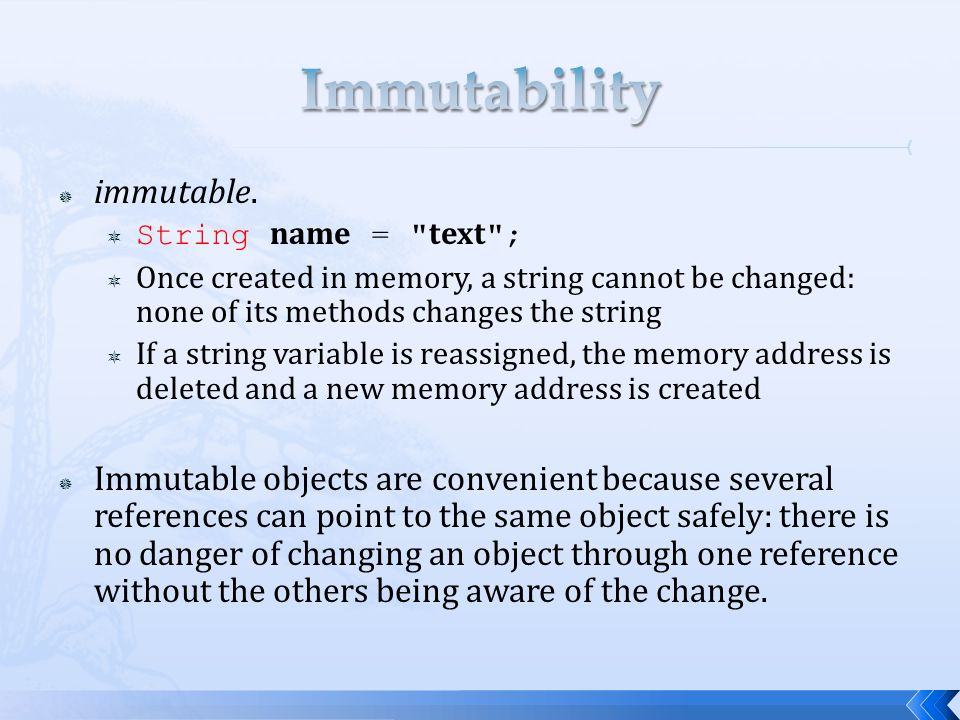Why Are Strings Immutable in Java? Ideal Practices and Usage Situations
Wiki Article
Unalterable Strings: A Key Part in Ensuring Data Uniformity and Reliability
In the world of information administration, the relevance of immutable strings can not be overemphasized. These unchanging series of characters play a critical role in supporting the honesty and accuracy of info within systems. By maintaining a state of immutability, information uniformity is made certain, promoting a foundation of reliability whereupon essential processes depend. The idea of immutable strings transcends plain technicality; it is a cornerstone in the facility internet of information administration. As we explore the advantages, implementation methods, and sensible applications of immutable strings, a more clear photo emerges of their vital nature in securing the digital landscape.The Principle of Immutable Strings
Immutable strings, a basic principle in programs, describe strings that can not be changed as soon as they are developed. Essentially, as soon as a string worth is appointed, any operation that appears to modify the string in fact produces a new string. This immutability makes sure data uniformity and reliability in applications, as it protects against unexpected modifications to the original information.
Benefits in Data Consistency
Data uniformity is important in numerous aspects of software growth, including data source monitoring, multi-threaded environments, and dispersed systems (Why are strings immutable in Java?). Immutable strings contribute considerably to attaining this consistency by protecting against data corruption as a result of concurrent accessibility. In circumstances where several procedures or threads engage with the same data all at once, unalterable strings serve as a secure against race problems and synchronization issues
Moreover, the immutability of strings streamlines debugging and screening processes. With immutable strings, designers can rely on that when a string is set, it will stay unchanged, making it less complicated to trace the source of mistakes and ensuring that test instances generate constant outcomes. This reliability in data managing eventually causes more secure and robust applications.

Executing Unalterable Strings
Making sure the immutability of strings requires a thoughtful strategy to their application in software application advancement. One essential strategy is to design string courses in such a way that protects against alterations once a string item is created. By making strings unalterable, designers can enhance data consistency and dependability in their applications.To implement unalterable strings efficiently, designers should prefer producing new string things instead of customizing existing ones. This practice ensures that when a string is designated a value, it can not be changed. Furthermore, any type of procedure that appears to modify the string should develop a brand-new string with the desired modifications instead of altering the go to website original.
Moreover, making use of immutable strings can streamline concurrency administration in multi-threaded settings. Since immutable strings can not be changed after creation, they can be safely shared amongst multiple threads without the threat of information corruption.
Duty in Integrity Guarantee
In software program advancement, the usage of unalterable strings plays a critical function in making sure the dependability of information operations. Immutable strings, when produced, can not be modified, making certain that the information they represent stays consistent throughout the application's implementation. This immutability home provides a level of assurance that the information being processed will not be inadvertently altered, bring about unforeseen end results or mistakes in the system.By integrating immutable strings right into software application style, designers can improve the integrity of their applications by reducing the dangers related to mutable information - Why are strings immutable in Java?. Immutable strings help in avoiding data corruption or unexpected alterations, which can be specifically crucial when dealing with delicate information or when information stability is extremely important
In addition, using immutable strings streamlines simultaneous processing, as numerous strings can securely access and share string information without the danger of one string changing the content while an additional reads it. This element adds considerably to the total dependability of the software application system, guaranteeing constant and predictable actions in information managing operations.
Applications and System Assimilation
The smooth integration of unalterable strings into different applications and systems is pivotal for ensuring robust data consistency and dependability across varied technological settings - Why are strings immutable in Java?. Immutable strings play an essential role in boosting the honesty of information exchanges and communications within facility software ecological communities. By incorporating unalterable strings right into applications, developers can minimize the more tips here risks associated with data tampering, unauthorized adjustments, and unintended alterations, thus strengthening the overall safety posture of the systemIn the context of system assimilation, unalterable strings offer as a foundational component for developing safe communication networks and promoting seamless information transfers between various elements. Their unalterable nature guarantees that information sent between systems remains website here unmodified and proven, reducing the likelihood of disparities or mistakes that might jeopardize the honesty of the entire system. Moreover, unalterable strings can enhance interoperability in between disparate systems by offering a standard layout for data representation, making it possible for extra reliable information processing and exchange protocols across interconnected systems. By adopting unalterable strings in applications and system assimilation procedures, organizations can fortify their data infrastructure and maintain the dependability and consistency of their information properties.
Conclusion
In final thought, unalterable strings play a crucial role in maintaining information uniformity and reliability in various applications and system assimilations. By making certain that strings can not be altered once produced, the integrity of information is protected, reducing the threat of errors and disparities. Executing immutable strings can considerably boost the integrity of systems, inevitably bring about more accurate and trustworthy data processing.
Report this wiki page